Many obstacles remain before Yucca Mountain could accept first nuclear waste shipments
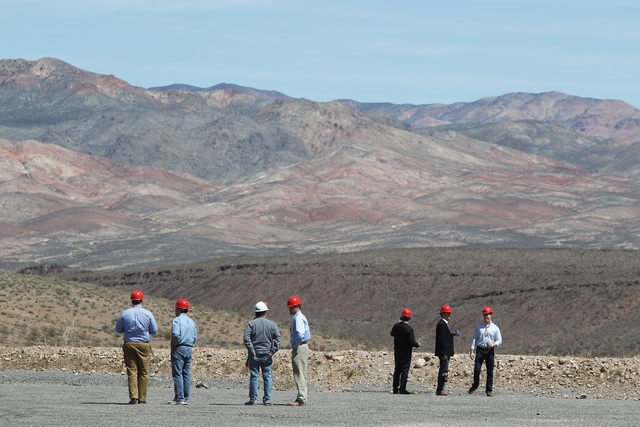
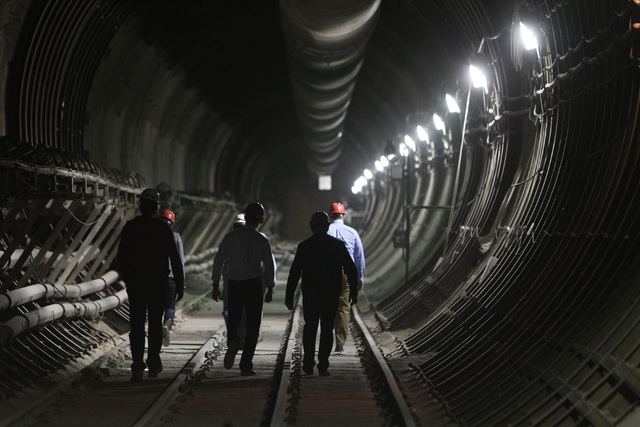


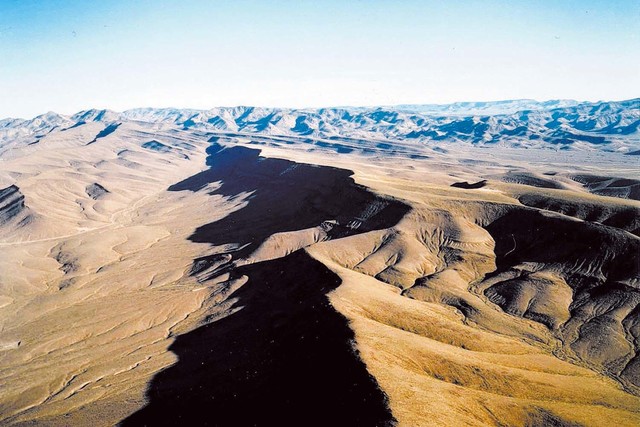
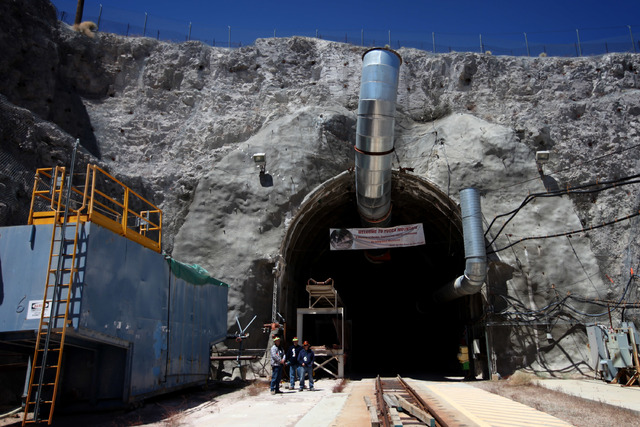
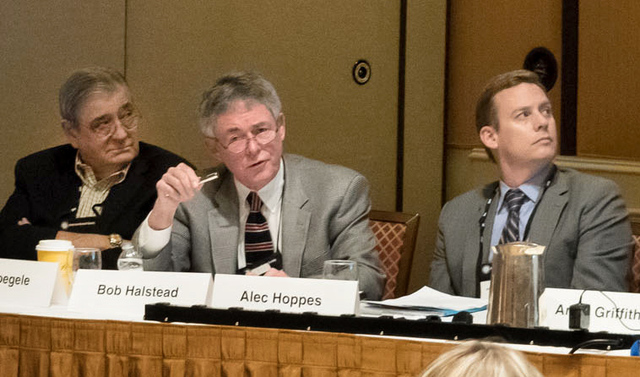
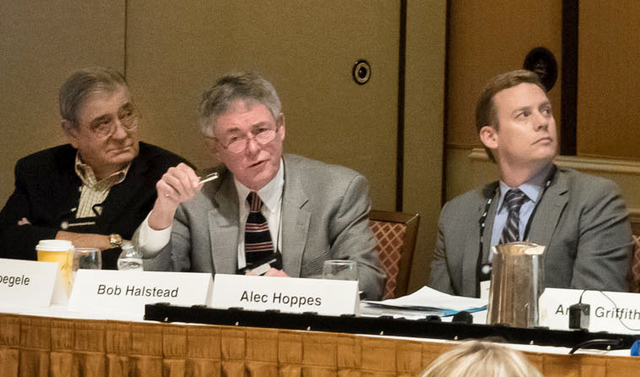
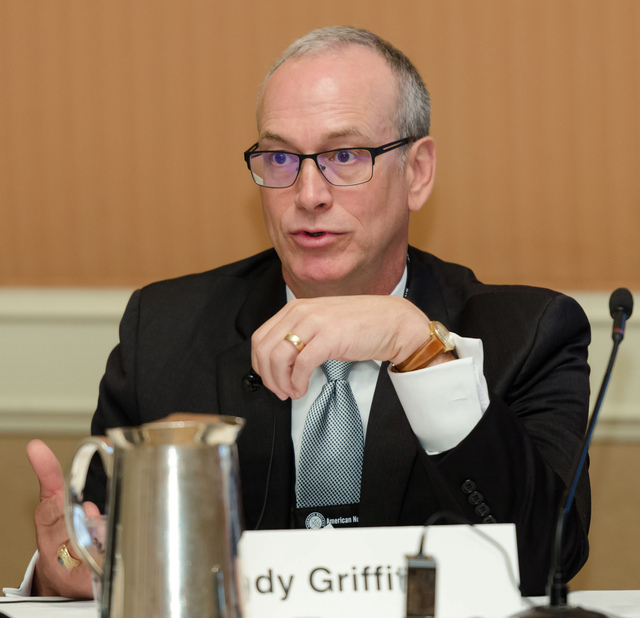
It would take more than a decade and cost at least $30 billion before the shuttered underground dump site at Yucca Mountain could begin accepting shipments of highly radioactive waste, according to experts on the controversial project.
Efforts to build a permanent repository for the nation’s high-level nuclear waste inside the Nye County mountain, about 100 miles northwest of Las Vegas, are currently dormant after the Obama administration declared the concept unworkable and cut off federal funding in 2010.
But the prospect that President-elect Donald Trump could propose reviving the project gained credence this week when Bloomberg News quoted two unidentified Trump advisers as saying that his transition team is actively discussing the option.
Experts on the Yucca Mountain project interviewed by the Review-Journal are divided on whether the plan to entomb 77,000 tons of used fuel from commercial power reactors and defense waste in tunnels inside the mountain is likely to spring back to life.
Bob Halstead, executive director of the Nevada Agency for Nuclear Projects, is among those who believe Trump will be hesitant to throw his support behind restarting Yucca Mountain.
‘DEAD AS A DOORNAIL’
“It’s dead as a doornail,” he said. “The Trump administration is not going to be any friend to nuclear power. They’re oil-and-gas guys.”
Michael Voegele, the former chief scientist for the Yucca Mountain Project, sees it differently.
“I think there is a good chance Congress will fund it and put it back on track, and I think it will take a couple years to get it moving again,” Voegele said. “When you start putting everything together, I think Yucca Mountain has a pulse.”
While the strength of that “pulse” is open to debate, the experts agree that a revival of the project first proposed in the late 1980s would be costly, technically challenging and politically complicated.
Halstead said the federal government would need to budget roughly $2 billion — $1.6 billion for the Department of Energy and $330 million for the Nuclear Regulatory Commission — just to restart licensing hearings on the project.
Based on past practice, the federal government also would be expected to pay $5 million to the state of Nevada and another $5 million divided among other stakeholders, including American Indian tribes and counties that would be affected by the project. That money is intended to help them make their case against Yucca Mountain.
That would just be the beginning of the spending. If the project was licensed and proceeded to construction, it would require building 40 miles of tunnels in the volcanic-rock ridge in order to create enough storage space to accommodate the nation’s current nuclear waste, Halstead said.
That helps explain why the overall cost estimate for the 100-year life-cycle of the project is $96 billion. That includes the roughly $15 billion that already has been spent over three decades to study the mountain and dig a 5-mile exploratory tunnel through it.
200 TECHNICAL CHALLENGES
That price tag assumes relatively smooth sailing for the project, but Halstead, who huddled with the state’s legal defense team Friday, said that won’t be the case.
The state maintains the Yucca Mountain site, with its engineered barriers to prevent radioactive particles from escaping, is flawed and has more than 200 technical challenges prepared that will “really pose a big obstacle” in the licensing proceedings should they resume, he said.
Key issues that the state could challenge include impacts on groundwater, the Energy Department’s “hot repository” concept – which envisions storage areas where temperatures can reach 96 degrees Celsius (nearly 205 Fahrenheit) — and plans to install titanium drip shields to prevent corrosion of waste canisters.
If the federal government wants go down that path, Halstead said, it will be like they “fell into a bear pit.”
While the retirement of the U.S. Senate’s presiding Democrat, Minority Leader Harry Reid, will remove the most influential Yucca Mountain opponent from the fray, Gov. Brian Sandoval made it clear this week that the state will be steadfast in its opposition to the project, regardless of what position the Trump administration takes on Yucca Mountain.
“As far as I’m concerned the state will continue to aggressively oppose the siting of storage of high-level nuclear waste there,” Sandoval said Tuesday.
PROPONENTS SEE AN OPENING
But with pressure building to find a solution to the growing stock of high-level commercial and government nuclear waste currently piling up at nuclear reactors around the country, many experts see a potential opening to get the process of finding a permanent nuclear waste repository moving again.
The Department of Energy’s point man on the project — Andrew R. Griffith, deputy assistant secretary for spent fuel and waste disposition for the Office of Nuclear Energy — said recently in Las Vegas that he believes an interim storage solution can be developed within the next decade. In that case, waste would be consolidated at several locations and kept in dry-cask storage at surface level or just below it.
Griffith, who spoke as a member of an expert panel at the American Nuclear Society’s winter meeting at Caesars Palace on the eve of the Nov. 8 election, said a permanent repository for high-level defense waste could open “within a 25-year time frame.”
“Things could be learned from a defense repository that could be applied to commercial,” he said. “The most important step is the next step to take to get started.”
Another panelist, Nye County Commissioner Dan Schinhofen, said that despite the Obama administration’s defunding of Yucca Mountain, a federal court upheld the project in 2013 and it remains the designated site for the permanent repository. As such, he believes the NRC should resume the licensing process.
“This is a national security situation,” Schinhofen said. “We need to have this stuff moved and put in a safe place.”
For his part, Reid says that attempts to revive the Yucca Mountain project are “doomed to fail,” even when he’s no longer around to lead the fight.
“It’s going to be expensive, and they’ll get nothing for it,” he said this week.
Contact Keith Rogers at krogers@reviewjournal.com or 702-383-0308. Find him on Twitter: @KeithRogers2
RELATED
Sandoval says Nevada will fight any bid to revive Yucca Mountain
Trump advisers consider reviving Yucca Mountain with Reid out of the way












